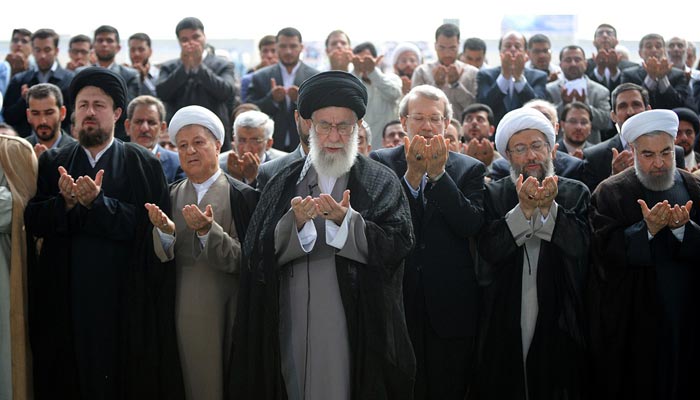A handout picture released by the official website of the Iranian Supreme Leader Ayatollah Ali Khamenei shows him leading the Eid al-Fitr prayers at Tehran's Grand Mosalla on Saturday.
Reuters/Dubai/Beirut
Supreme Leader Ayatollah Ali Khamenei withheld his verdict on Iran's nuclear deal on Saturday but in a fiery address vowed enduring opposition to the US and its Middle East policies, saying Washington sought Iran's 'surrender'.
In a speech at a Tehran mosque punctuated by chants of "Death to America" and "Death to Israel", Khamenei said he wanted politicians to examine the agreement to ensure national interests were preserved, as Iran would not allow the disruption of its revolutionary principles or defensive abilities.
An arch-conservative with the last word on high matters of state, Khamenei repeatedly used the phrase "whether this text is approved or not", implying the accord has yet to win definitive backing from Iran's factionalised political establishment.
"Whether the deal is approved or disapproved, we will never stop supporting our friends in the region and the people of Palestine, Yemen, Syria, Iraq, Bahrain and Lebanon. Even after this deal our policy towards the arrogant US will not change," he said.
Under the agreement reached on Tuesday, sanctions will be gradually removed in return for Iran accepting long-term curbs on a nuclear programme that the West has suspected was aimed at creating a nuclear bomb. Iran denies it seeks a nuclear bomb.
Khamenei's combative remarks about US policies in the Middle East may sit awkwardly with a diplomatic offensive Foreign Minister Mohammad Javad Zarif plans in coming days in the wake of the deal.
‘Insult’
Iran regards its nuclear programme as an emblem of national dignity and dynamism in the face of what it sees as decades of hostility from Western countries that opposed its 1979 Islamic revolution.
Khamenei did not echo criticisms of the deal made on Friday by a top cleric, Ayatollah Mohammad Ali Movahedi Kermani, who said in an address broadcast on radio that it reflected excessive demands by world powers that were an "insult".
But Khamenei's remarks radiated a broad mistrust of US intentions, claiming that successive American presidents had sought Iran's "surrender", and declaring that if war broke out America would come off worst, nursing "a broken head".
"The Americans say they stopped Iran from acquiring a nuclear weapon," Khamenei said.
"They know it's not true. We had a fatwa (religious ruling), declaring nuclear weapons to be religiously forbidden under Islamic law. It had nothing to do with the nuclear talks."
He said the slogans of "Death to America" and "Death to Israel" chanted at demonstrations in Iran this week supporting the Palestinian cause showed what Iranians think and "shook the atmosphere of the country".
"We have repeatedly said we don't negotiate with the US on regional or international affairs; not even on bilateral issues. There are some exceptions like the nuclear programme that we negotiated with Americans to serve our interests.
He said US policies in the region were "180 degrees" opposed to Iran's policies.
‘Legal path’
He paid tribute to Iranian negotiators who thrashed out the accord in marathon negotiations in Vienna, saying their work was worthy of reward, whether the deal was approved or not, and added there was now "a foreseen legal path" in Iran for the nuclear agreement to take.
"Our expectation is that those involved will very carefully keep the issues of the country and national issues in mind. And what they present to the people they should also be able to present to God with their head held high."
His remarks did not shed further light on Iran's procedures for ratifying the accord, which are not known in any detail. Zarif will brief parliament on July 21, Iranian media have said, and the agreement will also be examined the National Security Council, the country's highest security body.
Zarif, who plans to visit several countries in the region, told fellow Muslim countries on Friday that Iran hoped the accord could pave the way for more cooperation in the Middle East and internationally.

